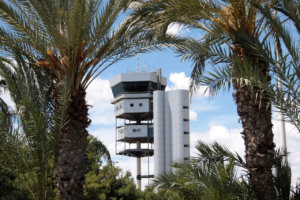
Alicante-Elche Airport has implemented a system aimed at saving the equivalent of seven Olympic-sized pools of water every year. The system is the first of its kind within Aena’s Spanish airport network, and one of the airport’s key efficient water management policies in response to concerns about climate change.
It takes advantage of water used in various processes at the airport, recycling it with the objective of obtaining a 15 per cent saving in water consumption. The innovative system has involved the installation of a separate network for collecting water from the terminal’s bathrooms and condensed water produced by air conditioners.
Once collected, the water is incorporated into a deposit tank and treated for its re-use in 350 toilets located in the airport’s restrooms. The system also uses a third source of wastewater – from the osmotised water plant that caters for restaurants in the terminal.
Alicante-Elche Airport has integrated the 2030 Sustainable Development Goals into its environmental policies, and efficient water resources management is in line with SDG 6 “Clean Water and Sanitation” norms.
In addition to the water recycling system, Alicante-Elche Airport has introduced various other initiatives to minimise water consumption, including leakage control, faucet timers, user awareness through informational posters, and the development of green areas that adopt xeriscaping criteria – among other measures.
Airport Noise Monitoring
Alicante-Elche is now one of six Aena airports in Spain to provide accredited noise data in accordance with the ISO 20906 regulation, which covers continuous noise monitoring in airport environments. The others are Málaga-Costa del Sol, Palma de Mallorca, Valencia, Adolfo Suárez Madrid-Barajas and Josep Tarradellas Barcelona-El Prat.
Aena is the largest airport operator in the world and also the first worldwide operator to provide noise data, at six of its major airports, by an accredited entity such as ENAC (recognised in more than 90 countries) in line with the ISO norm.
The six airports total more than 1,312,179 operations a year and have over 70 noise monitoring terminals. Associated with each Noise Monitoring System, and through the airports’ respective websites, a “WebTrak” interactive Noise Map is available to the public. This enables people to visualise aircraft trajectories, flight identification information and airport environmental noise. They also have the possibility of sending a complaint or claim directly to the airport, in the event of any irregularity being observed or identified in the aircraft’s operating procedures.
According to the airport operator, “This accreditation demonstrates Aena’s commitment to promote active and transparent communication with the communities located around airports, ensuring the quality of published data on noise pollution.”
